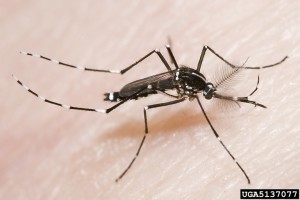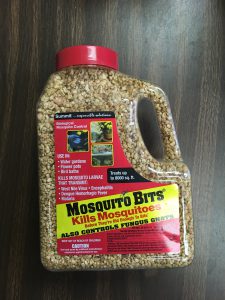Now that we’re getting plenty of rain and the temperatures are nice and toasty, our nemesis to enjoying the outdoors is back in full force. Yes, I’m talking mosquitoes, the reason for inventing window screens! If you’re gardening outside these days, you’ve probably been annoyed by one of the many mosquito species that occur in our area. Many of these mosquitoes are native species that play an important role in the food chain, feeding many aquatic and terrestrial wildlife, but some of them, like the daytime biting Asian tiger mosquito, are invasive species that were accidentally introduced. While mosquitoes are an important food source to more charismatic critters, they are annoying and can spread disease, and so we can benefit by reducing their presence.

The Asian tiger mosquito, another annoying invasive species. Photo credit: Susan Ellis, Bugwood.org.
In addition to the age-old advice of draining any standing water, there are other control methods that can be very effective at reducing the mosquito population. One of the most effective and least-toxic options is the use of Bti products. These products come in granular or “donut” forms with the smaller granules being best for various uses around the home and the dunks/donuts for larger areas of standing water like ponds. These Bti products are considered a type of biological control since it is a species of bacteria, Bacillus thuringiensis israelensis to be precise, that causes mosquito, blackfly, and fungus gnat larvae to perish as they wiggle around and grow into their pupal stage. Because it only affects a narrow range of species, it is considered a selective pesticide that does not cause harm to non-target species, such as bees, birds, butterflies, frogs, lizards, and other desirable garden visitors. Bti can be sprinkled into rain barrels, bird baths, bromeliads, gutters, and other places where water may stand more than 5-7 days, the amount of time needed for mosquito eggs to develop into adults.
If considering other methods of mosquito control, such as the use of foggers, keep in mind that many of the pesticides used to control adult mosquitoes are not selective products and can kill the pollinators you may be trying to invite to your garden. Additionally, planting citronella plants, eating copious amounts of garlic, wearing repellent bracelets, or using ultra-sonic devices or cell phone apps has not been shown to repel mosquitoes so stick to what is known to work.
For a more enjoyable mosquito season, keep the window screens tight, wear long pants and sleeves and use appropriate repellents when outdoors, and do your best to minimize standing areas of water. If you have questions about mosquitoes and their control, visit the UF/IFAS Florida Medical Entomology Lab website (https://fmel.ifas.ufl.edu/) and browse the many resources available.
- When to Worry About Your Citrus During Cold Weather - December 18, 2025
- A Tale of Two Hoses - November 13, 2025
- Anthracnose and Aster Yellowing Diseases Recently Diagnosed - August 28, 2025

